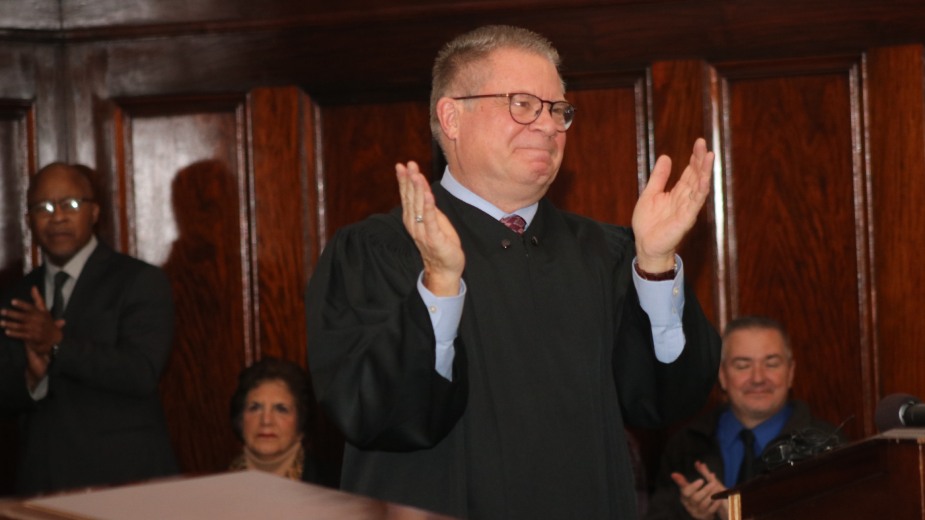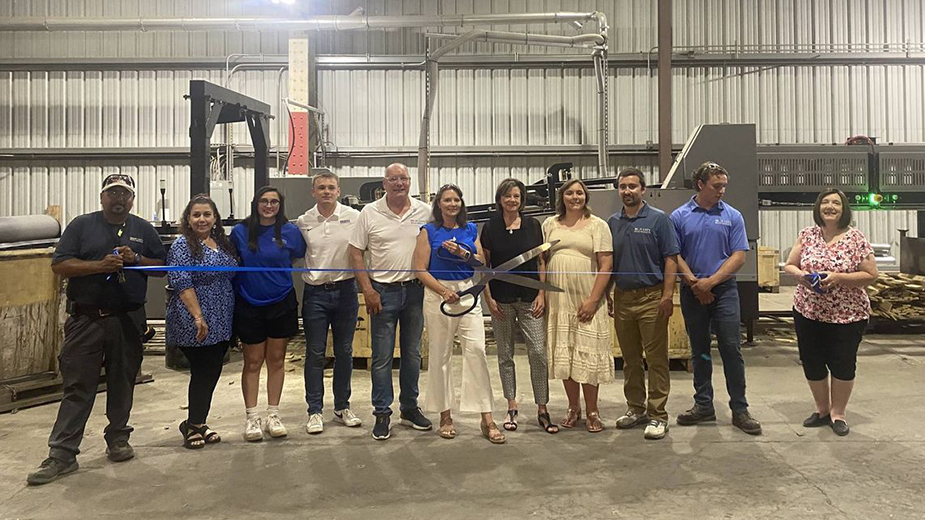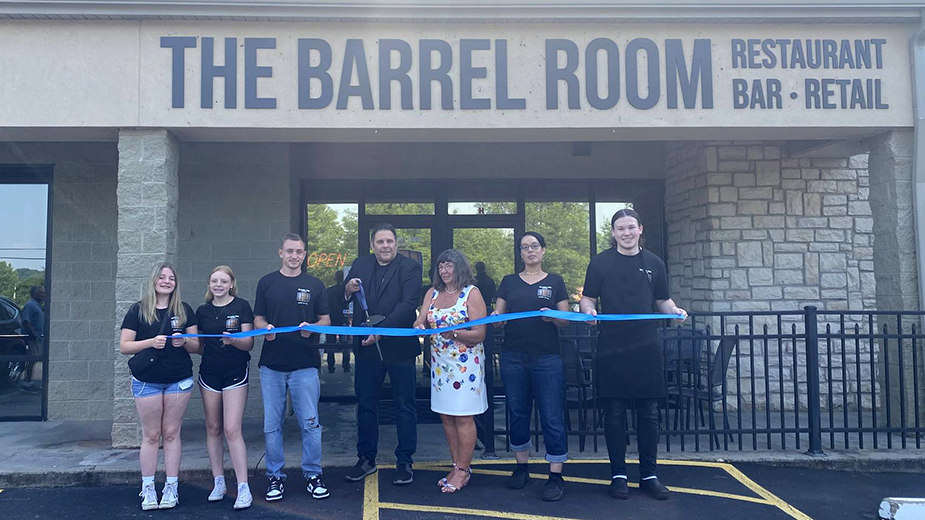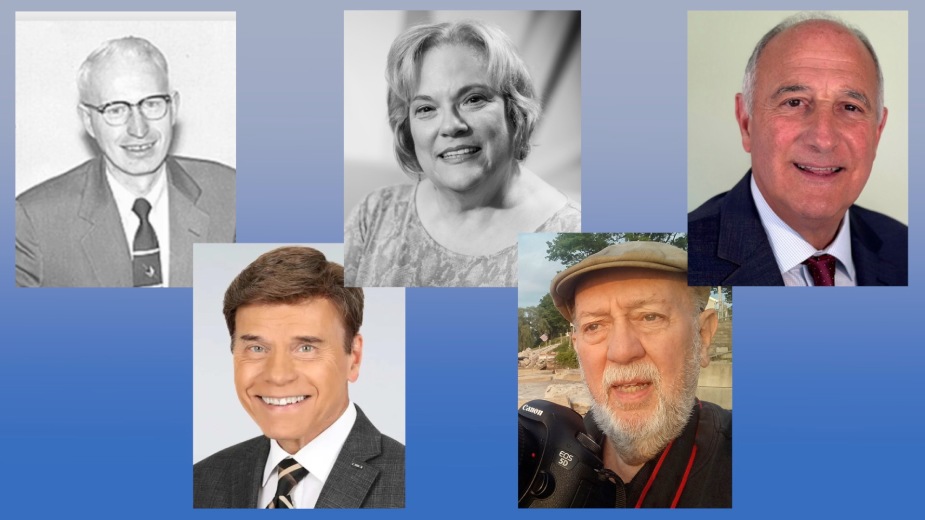Durkin’s Drug Court Celebrates 25 Years
YOUNGSTOWN, Ohio – For 25 years. Judge John M. Durkin has been changing lives of those who struggle with addiction through the Mahoning County Felony Drug Court that he established.
Ohio Supreme Court Justice Maureen O’Connor, several Mahoning County judges and many partners and individuals touched by the drug court were on hand to celebrate the milestone with Durkin on Wednesday.
Durkin started the drug court in in 1997, long before the state Supreme Court began certifying them and before the concept was readily accepted by those in law enforcement, prosecutors and others.
Many people felt there was already treatment in lieu of conviction and did not see a need for it, said Durkin. But he began setting up meetings with police chiefs, the faith community and others, pulling together people interested in finding a different solution.
“So there was a lot of opposition. There was a lot of uncertainly. But I knew – I hoped that this would be something that would take off and be successful and ultimately change lives,” Durkin said.
More than 1,300 people have been on the drug court docket, although not all have succeeded in beating addiction. Working with those in the program over months and even years, the program does not just treat the addiction, but some of the other underlying hurdles that could lead to someone commit a crime down the road. The team includes counselors, social service agencies and even businesses willing to help someone in need of a second chance.
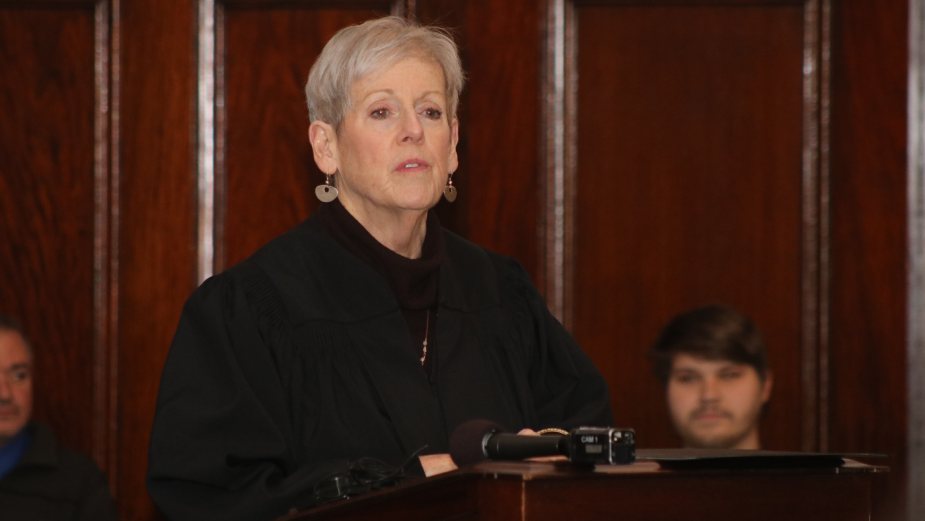
“We’ve had a number of businesses, a number of partnerships that have been forged,” Durkin said, “because we recognized that just addressing the substance use disorder or addressing the mental health aspect of their lives isn’t enough. If we set them up without addressing things like housing, without addressing trauma, without addressing education if they don’t have a high school diploma, without addressing employment, then we’re setting them up to fail. So we saw the importance of linking business with our court to afford these people with opportunity.”
Since July 2019 when the Ohio Supreme Court began to collect statistics, O’Connor said 67% of those attending felony drug court in Mahoning County have successfully graduated from the program.
“Judge Durkin is not afraid to put in the work on the front end to save lives and, as a result, to save taxpayers money,” O’Connor said. “He has compassion and he has good sense. When people wind up in the courtroom, they are at their lowest moments. They are in most need of respect, of humanity and of compassion.”
She urged those involved in the drug court to be an ambassador and make certain everyone in the community is aware of its successes in helping to treat those with substance abuse disorder.
Durkin said he was humbled that O’Connor attended the 25-year commemoration. Aside from being the first woman to be elected chief justice on the Ohio Supreme Court, O’Connor has been a pioneer and advocate for specialized drug court dockets. Additionally, Durkin credited her with starting the Regional Judicial Opioid Initiative (RJOI) in 2016.
O’Connor, who will retire at the end of this month, touted Durkin with being a leader, participating in the RJOI and pursuing the idea for the judicial Project Extension for Community Health Outcomes (ECHO). Durkin serves as a panelist for Project ECHO, which links judges with medical-based training on addiction, treatment and recovery.
O’Connor was not the only one praising Durkin.
Phil Nunes of the Ohio Justice Alliance for Community Corrections; Cindy O’Keefe, executive director of Travco Behavioral Health; and Youngstown Municipal Court Judge Carla Baldwin were among those who spoke about the success of the drug court under Durkin’s leadership.
“Today I want to salute you for the gift of you. I know you take you for granted, because you are you everyday,” Baldwin said, adding those who work with him can trust him to be kind, selfless and treatment-oriented everyday.
Baldwin said the courthouse would be filled if everyone touched by the ripple effect of Durkin and the drug court had attended Wednesday’s celebration.
O’Keefe said whenever she counseled those appearing in his courtroom, Durkin always wanted to know that person’s story and always asked what those providing them with treatment saw happening. It made her always feel like they were working together on a recovery team.
“Your honor, you are a role model, an educator and, to me, a recovery rock star,” O’Keefe said.
Three of those who came through the drug court program also spoke to the crowd gathered in the courtroom, talking about their struggles with addiction and how Durkin and those involved in the drug court positively affected their lives.
After more than 12 years of addiction, Josh Ellis said he now has been clean for 22 months and works for a large construction company. He is buying his house and appreciating the little things in life. Ellis credited Durkin with saving his life.
“It was a miracle what happened in this building,” Ellis said, adding Durkin never looked down on him and they were able to work together on his recovery man-to-man. “This is just living proof that this court does work.”
Another success story came from Ashley Perry, who missed her chemistry final at Youngstown State University for the opportunity to speak at the event.
“From the beginning, [drug court coordinator] Amy [Klumpp] and Judge Durkin, they knew what I needed, because I just didn’t know,” Perry said. “They never gave up on me, and they taught me to never give up on myself.”
Dan Mauch said during his time in drug court he felt a bond with Durkin, and he remembers how much it hurt during his last day in drug court when Durkin, with tears in his eyes, had to tell him, “There’s nothing else I can do for you.”
Mauch admits he was stubborn and didn’t listen to what he was being offered through the drug court. Although he said he did not successfully complete the program, Mauch said he still credits what he learned there with helping him become sober. Durkin continued to ask others about him long after he was no longer participating in the drug court.
“I just want to thank you for being an example and a mentor and a friend,” Mauch said.
Durkin calls it “God winks” that led to the start of the drug court. Durkin said he became aware of drug courts when he was still an attorney in 1996 and, by happenstance, he was the one to pick up the mail on the one day when a postcard came describing a five-year study on drug courts in Dade County, Florida. He became interested, and after mentioning it to the late Judge James McNally, he ended up going to a roundtable event with the Ohio State Bar Association only weeks later.
When he ran for judge, Durkin said he would start a drug court. While looking for partners and the financing needed for the drug court, Durkin met Dave Schaffer, then the new director of the county alcohol and drug addition services board. A friendship developed, and Shaffer helped Durkin make it a reality.
Durkin said he was asked 25 years ago how he would define success for the drug court. His answer remains the same today.
“If we can save one life, it’s been a success,” said Durkin, pulling from his pocket coins drug court graduates have given him representing their years of recovery. “They are worth nothing monetarily, but they are certainly worth more than anything you can put a price on.”
Pictured at top: Calling it a team effort, Judge John M. Durkin asked for those who have worked as a partner with the drug court to stand so they could be recogonized.
Copyright 2024 The Business Journal, Youngstown, Ohio.
